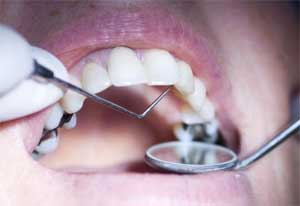- Home
- Editorial
- News
- Practice Guidelines
- Anesthesiology Guidelines
- Cancer Guidelines
- Cardiac Sciences Guidelines
- Critical Care Guidelines
- Dentistry Guidelines
- Dermatology Guidelines
- Diabetes and Endo Guidelines
- Diagnostics Guidelines
- ENT Guidelines
- Featured Practice Guidelines
- Gastroenterology Guidelines
- Geriatrics Guidelines
- Medicine Guidelines
- Nephrology Guidelines
- Neurosciences Guidelines
- Obs and Gynae Guidelines
- Ophthalmology Guidelines
- Orthopaedics Guidelines
- Paediatrics Guidelines
- Psychiatry Guidelines
- Pulmonology Guidelines
- Radiology Guidelines
- Surgery Guidelines
- Urology Guidelines
Antibiotic Use for management of dental Pain and Intra-oral Swelling: ADA Guidelines

The American Dental Association (ADA) has released a new Clinical Practice Guideline (2019) on antibiotics Use for the Urgent Management of Dental Pain and Intra-oral Swelling. It is a step forward towards the ADA's pledged commitment to the U.S. government's Antimicrobial Resistance Challenge. The guidance has been published in the November issue of the Journal of the American Dental Association.
Dentists and physicians often prescribe antibiotics to relieve dental pain and intraoral swelling. General and speciality dentists are the third-highest prescribers of antibiotics in all outpatient settings in the United States. The new guideline and accompanying systematic review found that healthy adults experiencing a toothache are best served not by antibiotics but by dental treatment and, if needed, over-the-counter pain relievers such as acetaminophen and ibuprofen.
Key Points
- The expert panel recommends dentists do not prescribe oral systemic antibiotics for immunocompetent adults with SIP with or without SAP (strong recommendation, low certainty). Clinicians should refer patients for DCDT and provide interim monitoring
- The expert panel suggests dentists do not prescribe oral systemic antibiotics for immunocompetent adults with PN-SAP (conditional recommendation, very low certainty). Clinicians should refer patients for DCDT and provide interim monitoring. If DCDT is not feasible, a delayed prescription for oral amoxicillin (500 milligrams, 3 times per d, 3-7 d) or oral penicillin V potassium (500 mg, 4 times per d, 3-7 d) should be provided.
- The expert panel suggests dentists prescribe oral amoxicillin (500 mg, 3 times per d, 3-7 d) or oral penicillin V potassium (500 mg, 4 times per d, 3-7 d) for immunocompetent adults with PN-LAAA (conditional recommendation, very low certainty). In addition, clinicians should provide urgent referral, because DCDT should not be delayed.
- The expert panel recommends dentists do not prescribe oral systemic antibiotics as an adjunct to DCDT for immunocompetent adults with PN-SAP or PN-LAAA (strong recommendation, very low certainty)
- The expert panel suggests dentists do not prescribe oral systemic antibiotics as an adjunct to DCDT for immunocompetent adults with SIP with or without SAP (conditional recommendation, very low certainty)
Key points-
- The guideline recommends against using antibiotics for most pulpal and periapical conditions and instead recommends only the use of dental treatment and, if needed, over-the-counter pain relievers such as acetaminophen and ibuprofen.
- Instead of prescribing antibiotics, dentists should prioritize dental treatments such as pulpotomy, pulpectomy, nonsurgical root canal treatment, or incision and drainage for symptomatic irreversible pulpitis, symptomatic apical periodontitis, and localized acute apical abscess in adult patients with a normal immune response.
- If a patient’s condition progresses to systemic involvement, showing signs of fever or malaise, then dentists should prescribe antibiotics.
Patients with the target dental conditions usually refer to pain as their chief symptom. Even though there is no physiopathologic rationale for the use of antibiotics for the management of inflammatory conditions and even the management of pain for patients with a dental infection, patients and clinicians still would be interested in learning the extent to which antibiotics would play any role in offering pain relief.

Disclaimer: This site is primarily intended for healthcare professionals. Any content/information on this website does not replace the advice of medical and/or health professionals and should not be construed as medical/diagnostic advice/endorsement or prescription. Use of this site is subject to our terms of use, privacy policy, advertisement policy. © 2020 Minerva Medical Treatment Pvt Ltd